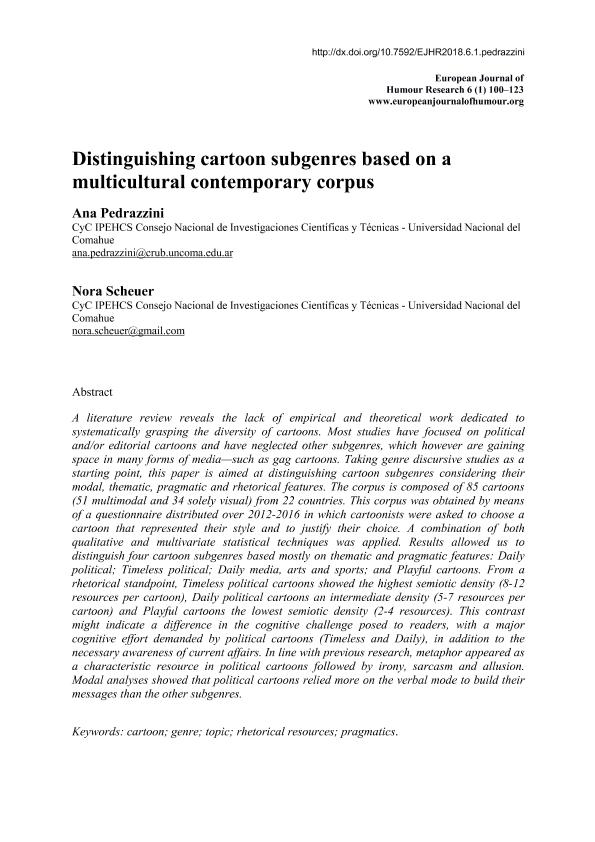Mostrar el registro sencillo del ítem
dc.contributor.author
Pedrazzini, Ana Mercedes

dc.contributor.author
Scheuer, Nora

dc.date.available
2020-08-25T14:48:17Z
dc.date.issued
2018-06
dc.identifier.citation
Pedrazzini, Ana Mercedes; Scheuer, Nora; Distinguishing cartoon subgenres based on a multicultural contemporary corpus; International Society for Humor Studies; European Journal of Humour Research; 6; 1; 6-2018; 100-123
dc.identifier.issn
2307-700X
dc.identifier.uri
http://hdl.handle.net/11336/112305
dc.description.abstract
A literature review reveals the lack of empirical and theoretical work dedicated to systematically grasping the diversity of cartoons. Most studies have focused on political and/or editorial cartoons and have neglected other subgenres, which however are gaining space in many media -such as gag cartoons. Taking genre discursive studies as a starting point, this paper is aimed at distinguishing cartoon subgenres considering their modal, thematic, pragmatic and rhetorical features. The corpus is composed of 85 cartoons (51 multimodal and 34 solely visual) from 22 countries. This corpus was obtained by means of a questionnaire distributed over 2012-2016 in which cartoonists were asked to choose a cartoon that represented their style and to justify their choice. A combination of both qualitative and multivariate statistical techniques was applied. Results allowed us to distinguish four cartoon subgenres based mostly on thematic and pragmatic features: Daily political; Timeless political; Daily media, arts and sports; and Playful cartoons. From a rhetorical standpoint, Timeless political cartoons showed the highest semiotic density (8-12 resources per cartoon), Daily political cartoons an intermediate density (5-7 resources per cartoon) and Playful cartoons the lowest semiotic density (2-4 resources). This contrast might indicate a difference in the cognitive challenge posed to readers, with a major cognitive effort demanded by political cartoons (Timeless and Daily), in addition to the necessary awareness of current affairs. In line with previous research, metaphor appeared as a characteristic resource in political cartoons followed by irony, sarcasm and allusion. Modal analyses showed that political cartoons relied more on the verbal mode to build their messages than the other subgenres.
dc.format
application/pdf
dc.language.iso
eng
dc.publisher
International Society for Humor Studies
dc.rights
info:eu-repo/semantics/openAccess
dc.rights.uri
https://creativecommons.org/licenses/by-nc-sa/2.5/ar/
dc.subject
CARTOON
dc.subject
GENRE
dc.subject
TOPIC
dc.subject
RHETORICAL RESOURCE
dc.subject
PRAGMATICS
dc.subject.classification
Periodismo

dc.subject.classification
Comunicación y Medios

dc.subject.classification
CIENCIAS SOCIALES

dc.title
Distinguishing cartoon subgenres based on a multicultural contemporary corpus
dc.type
info:eu-repo/semantics/article
dc.type
info:ar-repo/semantics/artículo
dc.type
info:eu-repo/semantics/publishedVersion
dc.date.updated
2019-10-15T17:57:00Z
dc.journal.volume
6
dc.journal.number
1
dc.journal.pagination
100-123
dc.journal.pais
Polonia

dc.description.fil
Fil: Pedrazzini, Ana Mercedes. Consejo Nacional de Investigaciones Científicas y Técnicas. Centro Científico Tecnológico Conicet - Patagonia Norte. Instituto Patagónico de Estudios de Humanidades y Ciencias Sociales. Grupo Vinculado del Instituto Patagónico de Estudios de Humanidades y Ciencias Sociales (IPEHCS): Sede Crub | Universidad Nacional del Comahue. Instituto Patagónico de Estudios de Humanidades y Ciencias Sociales. Grupo Vinculado del Instituto Patagónico de Estudios de Humanidades y Ciencias Sociales (IPEHCS): Sede Crub; Argentina
dc.description.fil
Fil: Scheuer, Nora. Consejo Nacional de Investigaciones Científicas y Técnicas. Centro Científico Tecnológico Conicet - Patagonia Norte. Instituto Patagónico de Estudios de Humanidades y Ciencias Sociales. Grupo Vinculado del Instituto Patagónico de Estudios de Humanidades y Ciencias Sociales (IPEHCS): Sede Crub | Universidad Nacional del Comahue. Instituto Patagónico de Estudios de Humanidades y Ciencias Sociales. Grupo Vinculado del Instituto Patagónico de Estudios de Humanidades y Ciencias Sociales (IPEHCS): Sede Crub; Argentina
dc.journal.title
European Journal of Humour Research
dc.relation.alternativeid
info:eu-repo/semantics/altIdentifier/url/https://europeanjournalofhumour.org/index.php/ejhr/article/view/233
dc.relation.alternativeid
info:eu-repo/semantics/altIdentifier/doi/http://dx.doi.org/10.7592/EJHR2018.6.1.pedrazzini
Archivos asociados
